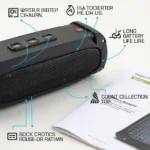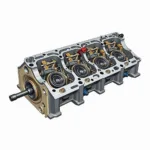Does this sound familiar? You turn the ignition key in your diesel vehicle, the engine starts briefly, and immediately shuts off again. This issue, often accompanied by rough idling or poor throttle response, can have various causes. This article explores the most common reasons why your diesel engine starts briefly and then dies, and provides valuable self-help tips.
Possible Causes When a Diesel Starts Briefly and Dies:
1. Fuel Supply:
Often, the problem lies in the fuel supply. Imagine this: The engine isn’t receiving enough diesel fuel, or the fuel is contaminated.
- Clogged Fuel Filter: A clogged fuel filter prevents enough diesel fuel from reaching the engine.
- Faulty Fuel Pump: A faulty fuel pump cannot adequately deliver fuel.
- Leaky or Clogged Fuel Lines: Damaged or clogged lines obstruct fuel flow.
- Contaminated Fuel: Water or dirt in the fuel can clog the fuel injectors and prevent the engine from starting.
“A poorly maintained fuel system is like a clogged artery in the human body,” says Dr. Ing. Hans Meier, author of the book “Modern Diesel Technology.” “Fuel flow must be ensured for the engine to operate optimally.”
2. Glow Plugs / Pre-glow System:
Especially in cold temperatures, the glow plugs are crucial for a reliable engine start. Imagine this: On a frosty morning, the plugs don’t pre-glow correctly, the diesel fuel cannot ignite optimally, and the engine won’t start.
- Faulty Glow Plugs: Faulty glow plugs do not reach the required temperature to ignite the diesel fuel.
- Faulty Glow Plug Relay: A faulty glow plug relay does not control the pre-glow time correctly, which can lead to starting difficulties.
3. Injection System:
The injection system is the heart of a diesel engine. It ensures that fuel is precisely metered into the combustion chamber. Imagine this: The injectors are clogged or faulty, the diesel fuel isn’t properly atomized, and the engine runs roughly or won’t start at all.
- Clogged or Faulty Injectors: Contaminants in the fuel can clog the fine nozzle openings, which impairs injection.
- Faulty Injection Control Unit (ECU): The injection control unit (ECU) regulates the injection quantity and timing. A fault can lead to starting problems.
4. Sensors:
Modern diesel engines are equipped with numerous sensors that record important parameters such as engine speed, temperature, and air mass. Imagine this: One of these sensors provides incorrect values to the engine control unit, causing injection and ignition to no longer function optimally.
- Faulty Crankshaft Position Sensor: The crankshaft position sensor provides information about the engine speed and crankshaft position. A faulty sensor can lead to starting problems.
- Faulty Camshaft Position Sensor: The camshaft position sensor provides information about the position of the camshaft. A faulty sensor can impair injection control.
5. Other Causes:
In addition to the points mentioned, there are other possible causes that can lead to starting problems in diesel engines:
- Faulty Immobilizer: A faulty immobilizer prevents the engine from starting.
- Low Fuel Pressure in the Fuel System: Low fuel pressure, for example, due to a leaky line, can impair fuel supply.
- Faulty Cylinder Head Gasket: A faulty cylinder head gasket can lead to compression loss, which prevents the engine from starting correctly.

